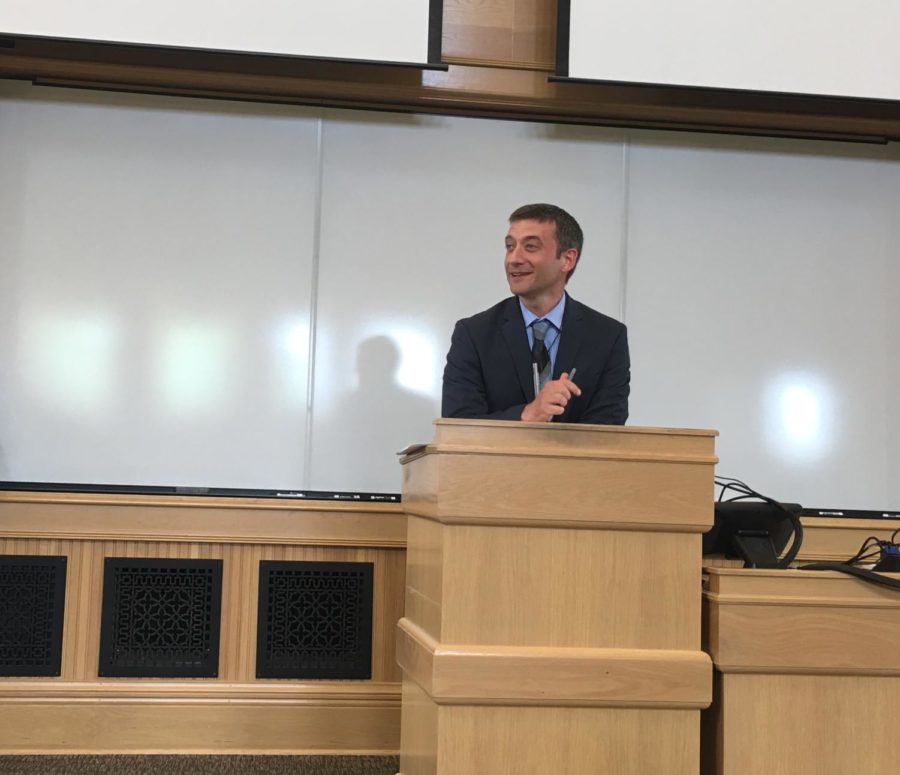Sixth Science Communication Symposium comes to Ames
June 9, 2018
People grow more and more dependent on science and technology with each passing year, and scientists are tasked with establishing credibility with the non-scientific community. This task presents them with some challenging questions.
Why should people trust scientists who say CO2 emissions are warming the earth’s climate when Scott Pruitt, the head of the Environmental Protection Agency, says otherwise? Isn’t there a conflict of interest when scientists rely on their research to get them grant money? How can we trust them about such grandiose topics?
These topics and many others were explored at Iowa State’s sixth Summer Symposium on Science Communication. Researchers and scholars from an array of academic fields traveled to Ames June 8 and 9 to give presentations, share ideas and participate in educational workshops about the role of trust and credibility.
Nearly 50 scholars registered for the symposium, and they all agreed that there is no one set definition of “trust.”
“Our ideas of trust are built across historical backgrounds,” said Denise Tillery, Associate Dean of Liberal Arts at the University of Nevada, Las Vegas. “These ideas of trust matter in different ways and different contexts.”
Tillery gave a presentation Saturday afternoon alongside Lauren Cagle, assistant professor of writing and rhetoric at the University of Kentucky. They both analyzed trends in social media discord about science.
“We observed when scientists are demonstrated as people trying to understand nature by methods of painstaking accumulation and collaboration, it helps build trust,” Cagle said. “Some people get this idea that their nefarious, grant-hungry researchers.”
Kathleen Hunt, an organizer of the symposium and Iowa State professor of agricultural communications, announced a new online repository for scholars like Cagle and Tillery to publish their research.
“We worked with the Iowa State library to get it operational,” Hunt said. “The repository helps us post these articles ourselves, and gives scholars more control of where their research goes after it gets published.”
The Iowa State repository provides free and open access to articles, theses, dissertations and other forms of published research from Iowa State students and faculty.
This year was Hunt’s second Science Communication Symposium, and she enjoyed the mix of academics the event hosted.
“This symposium brings together a small but rich group of scholars,” Hunt said. “They’re really willing to reach across disciplinary boundaries and collaborate with one another.”
Some of those scholars, like Shelly Galliah from Michigan Tech University, travelled more than 10 hours to present to Ames to present their research.
Galliah presented Saturday in Morrill Hall. Her research focused on the political satirists play in shaping public discourse about the sciences. She analyzed tens of thousands of comment boards on social media, and even used her own computer code to record how often certain videos were shared over time.
“Even if they’re exaggerated, comments on social media can reveal holes in a speaker’s tactics,” Galliah said.
In her research, Galliah also discovered which kinds of videos on YouTube foster the greatest “reply densities,” which refers to actual back-and-forth conversations as opposed to stand alone comments.
She found that 36 percent of videos with the highest reply densities were religious, 34 percent were political and 14 percent regarded the sciences. Videos about climate change in particular made up 4 percent of the highest reply density videos.
“It may not seem like much, but 4 percent is quite a lot for a specific topic,” Galliah said.
For her presentation, Galliah focused on one video she analyzed, which featured John Oliver mocking modern media coverage of climate change and a guest appearance from Bill Nye. Of those whose commented on the video, 43.8 percent “slightly to strongly disapproved of the video and it’s argument.”
“I was surprised at the amount of people who attacked the credibility of Oliver and Nye,” Galliah said. About half of the critiques were of this nature, and even came from those who believed in climate change.
Since neither Nye or Oliver are climate scientists, they don’t possess the credentials to sway certain groups of people. Also, Oliver is a comedian, and while his humor is appealing to his fans it comes off as condescending to people who don’t share his views.
“Political satirists should do more to get actual specialists on their shows” Galliah said. “They can embrace their celebrity, but should admit their lack of expertise.”







